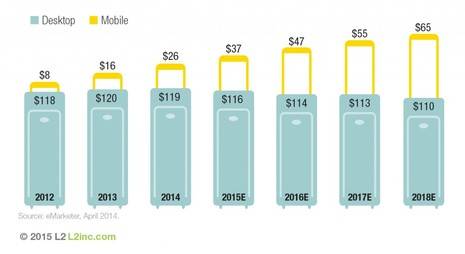
Hotel Industry’s Untapped Opportunity to Win Back Market Shares from OTAs. U.S. Digital Travel Sales by Device – 2012–2018E, IN USD BILLIONS (source: L2inc)
Online travel agencies (OTAs) like Kayak or Bookings.com will take at least 20%, roughly $32* billion dollars, in commissions from hoteliers this year. That number continues to rise as consumers, especially millennials, become increasingly reliant on OTAs for price comparison, ratings, inventory. Recognizing their advantage, OTAs are increasing their fees: Expedia’s new and controversial Accelerator “payforpositioning” program will raise fees to as much as 40% in exchange for premium viewability. To reverse this trend, Hotels can take back massive shares of profits by engaging directly with customers through a grossly untapped channel: the peertopeer viral network.
Consider the Customer Journey
A Google research study found that the best time to influence a traveler is during the research phase of planning. Yet, reaching consumers at this unstructured and informal phase is nearly impossible.
Our key insight comes from observing the customer travel planning and booking journey. After a traveler has chosen her destination and purchased her flight, she will turn Expedia or Tripadvisor instead of booking direct. In fact, three out of four travelers will book through OTAs because it offers a large inventory of hotels, competitive prices, and reviews. On average a consumer will visit 38 different sites before making a reservation of any kind.Hotels have an uphill battle to break through the noise for a customer’s attention.
We also found that travelers have a natural tendency to talk about their trips afterwards with family and friends. They give reports of their activities, accommodations, entertainment, dining, and what went well and what did not. These conversations go beyond just inperson. Consumers use mobile apps like Snapchat, Instagram, and Facebook to capture moments in real time, and to share with millions of on the Internet.
Get to the Customer First (Through what they do last)
To win back direct customers, hotels need to influence travelers before they reach online travel sites, through wordofmouth campaigns that target the end of a guest trips. Whether a peertopeer, referral, or a wordof mouth campaign, the results are one in the same. They are Participatory Marketing™ strategies turn customers into advocates for the brand. Hotels can insert themselves in these organic yet predictable posttrip conversations, and give customers a reason to become an ambassador to tell the next person about their stay. A campaign targeting the end of one’s journey pushes a hotel through the noise, and jumps ahead of OTAS to top of mind, before the travel planning journey even begins.
Read rest of the article at: Hospitality Net




